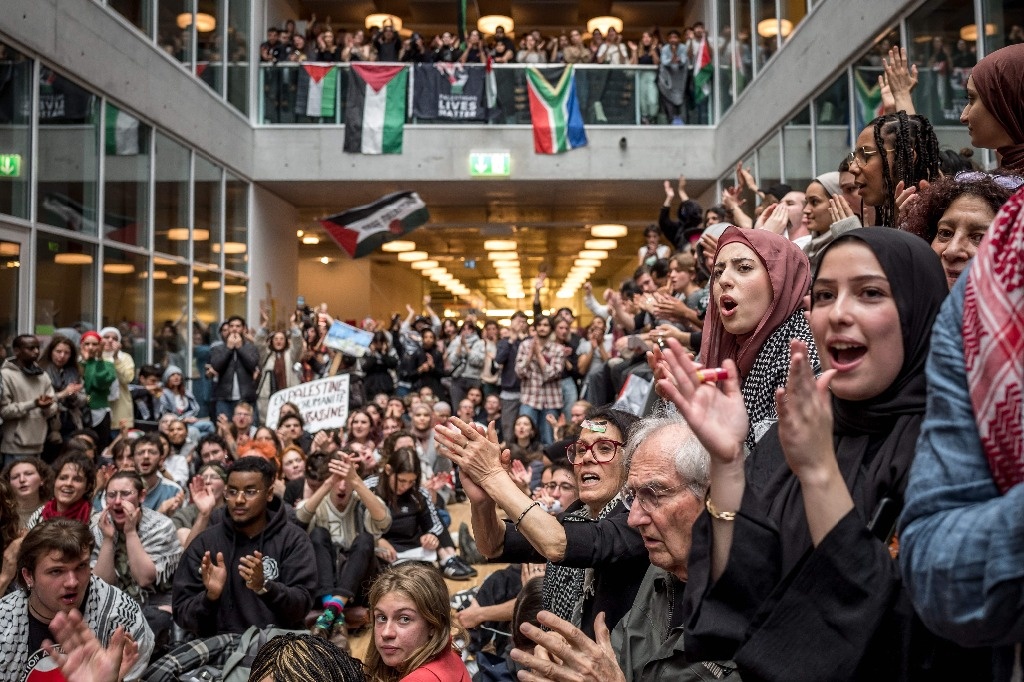Rafah. Israeli tanks entered the city of Rafah last night and approached up to 200 meters from the border crossing with Egypt; Shortly after, this city in the southern Gaza Strip was bombed.
Earlier, Hamas had announced that it accepted a ceasefire proposal presented to it by Egypt and Qatar, which was celebrated by the population, but Israel clarified that the pact did not comply with its central demands
and that he would continue with the attack on Rafah, although he would continue with the negotiations.
The risky diplomatic and military maneuvers keep hope alive – although minimal – for an agreement that can at least suspend a conflict that in seven months has left more than 34,700 Palestinians dead. Looming over the dispute was the threat of a full-scale Israeli attack on Rafah, a move the United States opposes and which aid groups warn would be disastrous for the nearly 1.4 million Palestinians sheltering there.
The acceptance of the Hamas ceasefire agreement came hours after Israel ordered some 100,000 Palestinians to evacuate east of Rafah, in a sign of an imminent invasion.
The proposal did not cover central demands
Israel’s war cabinet has decided to continue the operation in Rafah, Prime Minister Benjamin Netanyahu’s office said. He added that while the proposal that Hamas accepted was far from addressing our core demands
will send negotiators to Egypt to work on an agreement.
The Israeli army reported that it would carry out targeted attacks
against Hamas in eastern Rafah. Shortly afterward, Israeli tanks entered the city, a Palestinian security official reported.
The operation appeared limited in scope, an Egyptian official said. Hamas’s Al Aqsa television station pointed out that the Israeli authorities assured the Egyptian government that they would withdraw at the conclusion of the operation. The Ap news agency could not independently confirm the magnitude of the operation.
US President Joe Biden spoke with Netanyahu and reiterated his reservations about the military operation in Rafah. Biden said agreeing to a ceasefire with Hamas is the best way to protect the lives of Israeli hostages held in Gaza, according to a National Security Council spokesperson.
Netanyahu maintained that conquering Rafah – Hamas’s last significant stronghold in Gaza, according to Israel – is vital to ensuring that the group cannot regain its military capabilities and repeat an attack like the one it carried out on October 7, which sparked this war. .
Columns of smoke over Rafah after the Israeli bombings, yesterday. Photo Afp
The spokesman for the United States Department of State, Matthew Miller, said that his country’s authorities were reviewing Hamas’ response and were discussing it with their partners in the region. A US official said Washington was examining whether Hamas had accepted a version of the deal endorsed by Israel and international negotiators.
It is unknown whether the proposal that Hamas accepted was very different from the one that US Secretary of State Antony Blinken had pressured the militant group to accept last week, which, according to Blinken, included a large number of Israeli concessions.
Egyptian officials explained that the proposal included a multi-stage ceasefire, starting with the limited release of hostages and a partial withdrawal of Israeli forces from Gaza. The two sides will also negotiate a permanent calm
which would lead to the full release of the hostages and a further Israeli withdrawal from the territory.
Hamas was seeking clearer guarantees for its central demand of an end to the war and a complete withdrawal by Israel in exchange for the release of all hostages, but it is unknown if any changes were made.
Tel Aviv has rejected this proposal on several occasions, and has promised to continue its military campaign until Hamas is destroyed.
Relatives of hostages protest
Relatives of those kidnapped in the strip took to the streets of Jerusalem, Tel Aviv and Haifa, among other cities, to demand that their government reach an agreement for the release of the hostages.
Nadav Shoshani, spokesman for the Israeli army, said that about 100,000 people were instructed to evacuate Rafah and move to a humanitarian zone created by Israel called Muwasi, a makeshift camp on the coast.
Around 450 thousand displaced Palestinians are already in Muwasi. The United Nations agency in charge of Palestinian refugees said it is giving them help, but that conditions are minimal, with few bathrooms or sanitary facilities in a largely rural area, where many families have been forced to dig latrines.
The Palestinian Red Crescent announced that miles
of people were leaving Rafah, in the face of warnings from the Israeli army about a imminent
offensive, at a time when Israeli bombings increased on the areas where the population was ordered to evacuate.
The Palestinian news agency WAFA said that yesterday’s airstrikes in different parts of Rafah destroyed roads, agricultural land, residential complexes and animal farms; They also caused fires in warehouses and damage to several humanitarian aid trucks. The bombings left at least five people dead, including a child and a woman, according to hospital officials.
The Palestinian militant group Hamas accepted the Egyptian-Qatari ceasefire pact, but Israel has said the conditions do not meet its demands and it will press ahead with its attacks in Rafah. Infographic Graphic News
#Israeli #bombings #tank #raid #Rafah
– 2024-05-08 17:58:12
